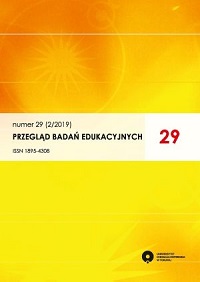The Normative Definitions of Inclusive Education Developed by Teachers from Numerous Schools and of Varied Professional Experience
DOI:
https://doi.org/10.12775/PBE.2019.017Keywords
inclusion, inclusive education, aims, definitions, teachers, conditionsAbstract
The purpose of the research as presented by us in this article, was to determine the aims with which teachers from various types of schools and of varied professional experience develop normative definitions of inclusive education. We paved the way to formulate these aims in the research tool with the analysis of literature on the subject, demonstrating three main trends in defining inclusive education. One hundred and eighty-eight teachers were surveyed, providing answers to the following research questions:
1/ domination of aims in definitions being developed and 2/ their correlations with professional experience and place of employment.
We subjected them to a quantitative and correlational analysis. As a result, we determined that the aims related to meeting the needs of students with developmental disorders and those at risk of educational exclusion amongst the teacher definitions of inclusive education are dominant. In fact, the aims of the “every school for every student” idea of optimal inclusion are virtually missing. We determined that in the subject group, the type of school, teacher employment as well as their professional experience is related to the definition being developed.
References
Ainscow, M. (1999). Understanding the Development of Inclusive Schools. London: Falmer Press.
Ainscow, M., Booth, T., Dyson, A., Farrell, P., Frankham, J., Gallannaugh, F., Howes, A., Smith, R. (2006). Improving Schools, Developing Inclusion. London: Routledge.
Ballard, K. (1995). Inclusion, paradigms, power and participation. In: D. Clark, A. Dyson, A. Millward (eds.). Towards Inclusive Schools? (pp. 1–14). London: David Fulton Publishers.
Baron, R.A., Byrne, D. (1991). Social Psychology: Understanding Human Interaction. Boston: Allyn and Bacon.
Barton, L., Armstrong, F. (2007). Policy, Experience and Change and the Challenge of Inclusive Education: The Case of England. In: L. Barton, F. Armstrong (eds.). Policy, Experience and Change: Cross Cultural Reflections on Inclusive Education (pp. 5–18). Dordrecht: Springer.
Booth, T., Ainscow, M. (2002). Index for inclusion: developing learning and participation in schools. Bristol: CSIE.
Campbell, C. (2002). Conceptualisations and Definitions of Inclusive Schooling. In: C. Campbell (ed.). Developing Inclusive Schooling: Perspectives, Policies and Practices (pp. 35–53). London: Institute of Education, University of London.
Chrzanowska, I. (2016). Opinie nauczycieli szkół specjalnych na temat edukacji włączającej –uczeń ze SPE w szkole włączającej, Studia Edukacyjne, 41, pp. 55–74, DOI:10.14746/se.2016.41.4.
Clark, C., Dyson, A., Millward, A. (1995). Towards Inclusive Schools? London: David Fulton. Europejska Agencja ds. Specjalnych Potrzeb i Edukacji Włączającej (2014). Pięć kluczowych przesłań dla edukacji włączającej. Od teorii do praktyki. Odense, Dania: Europejska Agencja ds. Specjalnych Potrzeb i Edukacji Włączającej. (electronic version).
Gerschel, L. (2003). Connecting the Disconnected: Exploring Issues of Gender, ‘Race’ and SEN within an Inclusive Context. In: C. Tilstone, R. Rose (eds.). Strategies to Promote Inclusive Practice (pp. 48–66). London: RoutledgeFalmer.
Hall, J. (1996). Integration, Inclusion — what does it All Mean? In: J. Coupe O’Kane J. Goldbart (eds.). Whose Choice? Contentious Issues for Those Working with People with Learning Difficulties (pp. 25–37). London: Fulton.
Isosomppi, L., Leivo, M. (2015). Becoming an Inclusive Teacher at the Interface of School and Teacher Education. Procedia – Social and Behavioral Sciences, 171, pp. 686 – 694. DOI:10.1016/j.sbspro.2015.01.178.
Knight, T. (2000). Inclusive Education and Educational Theory: Inclusive for What? Melbourne Studies in Education, 41, pp. 17–43.
Knight, T., Pearl, A. (2000). Democratic Education and Critical Pedagogy. The Urban Review, 32(3), pp.197-226, DOI:10.1023/A:1005177227794.
Lambe, J. (2007). Northern Ireland Student Teachers’ Changing Attitudes Towards Inclusive Education During Initial Teacher Training. International Journal of Special Education, 22(1), pp. 59–71.
Ministerstwo Edukacji Narodowej (2014). Edukacja włączająca uczniów niepełnosprawnych. Warszawa: MEN.
Mittler, P. (2000). Working Towards Inclusive Education: Social Contexts. London: David Fulton Publishers.
Movkebaieva, Z., Oralkanova, I., Uaidullakyzy, E. (2013). The Professional Competence of Teachers in Inclusive Education, Procedia – Social and Behavioral Sciences, 89, pp. 549–554, DOI:10.1016/j.sbspro.2013.08.892.
Nowak-Dziemianowicz, M. (2001). Oblicza nauczyciela. Oblicza szkoły. Toruń: Adam Marszałek.
Peters, S. J. (2003). Inclusive Education: Achieving Education for All by Including Those with Disabilities and Special Education Needs (English). Washington, DC: World Bank.
Booth, T., Ainscow, M. (2011). Polish adaptation Wiszejko-Wierzbicka, D. et al. Przewodnik po edukacji włączającej rozwój kształcenia i uczestnictwa w życiu szkoły. Warszawa: Olimpiady Specjalne Polska.
Rouse, M., Florian, L. (1996). Effective Inclusive Schools: A Study in Two Countries. Cambridge Journal of Education, 26(1), pp. 71–85.
Slee, R., Allan, J. (2001). Excluding the Included: A Reconsideration of Inclusive Education. International Studies in Sociology of Education, 11(2), pp. 173–192, DOI:10.1080/09620210100200073.
Thomas, G. (1997). Inclusive Schools for an Inclusive Society. British Journal of Special Education, 24(3), pp. 103–107.
Topping, K., Maloney, S. (2005). The RoutledgeFalmer Reader in Inclusive Education. London, New York: Routledge.
Uditsky, B. (1993). From Integration to Inclusion: The Canadian Experience. In: R. Slee (ed.). Is There a Desk with my Name On It: The Politics of Integration (pp. 82–95). London: The Falmer Press.
UNESCO (2005). Guidelines for Inclusion: Ensuring Access to Education for All. Paris: UNESCO.
UNESCO (2009). Policy Guidelines on Inclusion in Education, Paris: UNESCO.
Downloads
Published
How to Cite
Issue
Section
Stats
Number of views and downloads: 689
Number of citations: 0



